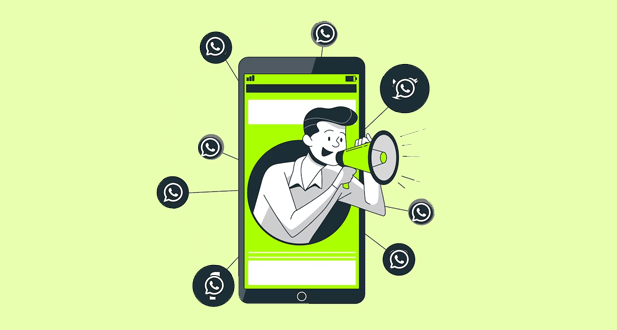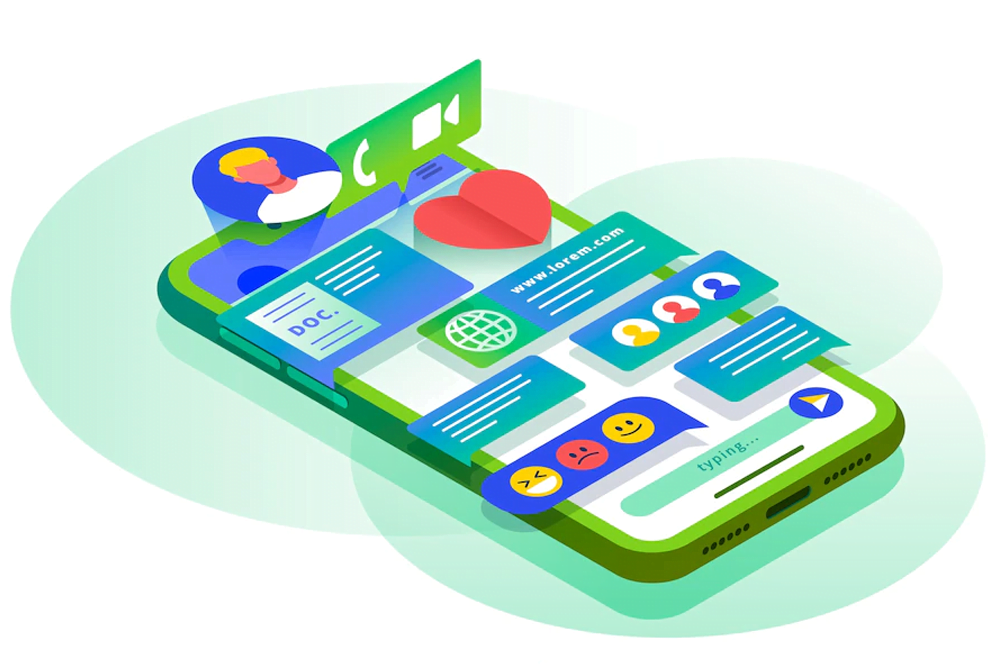What is a Whatsapp marketing campaign?
WhatsApp marketing campaign refers to the process of promoting a product, service or brand through the use of WhatsApp messaging platform. It involves creating marketing messages and distributing them to the targeted audience using the WhatsApp platform.
To launch a successful WhatsApp marketing campaign, businesses need to have a well-planned strategy in place. They need to identify their target audience, understand their needs, and create messages that will resonate with them. The messages should be personalized and engaging to encourage the audience to take action.
Businesses can use various tools and features available on WhatsApp to run their marketing campaign. They can use WhatsApp Business API, which allows them to automate messages and manage conversations with their customers. They can also create WhatsApp groups or broadcast lists to reach a large number of people at once.
The success of a WhatsApp marketing campaign depends on several factors such as the quality of the message, the relevance of the message to the target audience, and the timing of the message. Businesses need to be careful not to spam their customers with irrelevant messages or send messages at inconvenient times. They should also be transparent about their intentions and comply with privacy laws.
Some common examples of WhatsApp marketing campaigns include sending promotional messages, offering discounts and coupons, providing customer support, and conducting surveys or polls. WhatsApp marketing campaigns can be effective in building brand awareness, generating leads, and increasing sales.
WhatsApp marketing campaigns are an effective way for businesses to connect with their customers and promote their products or services. However, businesses need to be strategic and careful in their approach to ensure that their messages are relevant, engaging, and comply with privacy laws.
Why Should You Use WhatsApp Marketing?
WhatsApp is a popular instant messaging application that has more than 2 billion active users worldwide. With its widespread use, it has become an attractive platform for businesses to connect with their target audience. Here are some reasons why you should use WhatsApp marketing for your business:
1. High Engagement Rate: WhatsApp has a high engagement rate because it allows businesses to send personalized messages directly to their customers. This means that you can send customized messages to your customers and keep them updated about your latest products, services, and promotions.
2. Cost-effective: WhatsApp is a cost-effective marketing tool because it is free to use and allows businesses to communicate with their customers without any additional costs. Unlike traditional marketing methods, you don’t have to spend a lot of money on advertising or promotions to reach your target audience.
3. Easy to Use: WhatsApp is easy to use and requires no technical expertise. It is user-friendly and can be used by anyone who has a smartphone and an internet connection. This makes it an ideal marketing tool for small businesses that may not have the resources to invest in complicated marketing campaigns.
4. Direct Communication: WhatsApp allows businesses to communicate directly with their customers. This means that you can have one-on-one conversations with your customers and address their queries and concerns in real-time. This can help build trust and loyalty among your customers.
5. Increased Sales: WhatsApp marketing can help businesses increase their sales by providing a direct line of communication with their customers. You can send personalized messages to your customers, informing them about your latest products, services, and promotions. This can help create a sense of urgency and encourage them to make a purchase.
6. Wide Reach: WhatsApp has a wide reach because it is a popular application used by people all over the world. This means that you can connect with customers from different countries and cultures, allowing you to expand your customer base and increase your brand awareness.
WhatsApp marketing can be a powerful tool for businesses to connect with their target audience. Its high engagement rate, cost-effectiveness, ease of use, direct communication, increased sales, and wide reach make it an attractive platform for businesses of all sizes.
WhatsApp Marketing Strategy
1. Create a WhatsApp Business account: The first step to implementing a WhatsApp marketing strategy is to create a WhatsApp Business account. This account allows businesses to interact with their customers more efficiently by providing features such as automated messages, quick replies, and labels. WhatsApp Business also allows businesses to create a business profile that includes their address, contact details, and business hours. This profile gives customers the necessary information they need to engage with the business.
2. Build a targeted contact list: The next step is to build a targeted contact list. Businesses can do this by promoting their WhatsApp Business account on their website, social media pages, and other marketing channels. They can also encourage their existing customers to opt-in to receive messages on WhatsApp. It is essential to ensure that the contact list is composed of people who are interested in the business’s products or services.
3. Use WhatsApp Business API for automated messaging: WhatsApp Business API allows businesses to automate messages to their customers. This feature is particularly useful for sending transactional messages such as order confirmations, shipping updates, and appointment reminders. Automated messaging saves time and ensures that customers receive timely updates. However, businesses must ensure that the messages they send are relevant and not spammy.
4. Use WhatsApp Business for customer service: WhatsApp Business is an excellent platform for customer service. Businesses can use the app to handle customer inquiries, complaints, and feedback. The app allows businesses to respond quickly and efficiently, which can help improve customer satisfaction. However, it is essential to ensure that the customer service team is adequately trained to handle customer inquiries and complaints effectively.
5. Use WhatsApp Business for product launches and promotions: Businesses can use WhatsApp Business to promote new products and services to their customers. They can create engaging content such as product images, videos, and descriptions to share with their customers. WhatsApp Business also allows businesses to send promotional messages and offers to their customers. However, it is important to ensure that the promotions are relevant to the target audience and not spammy.
6. Personalize messages: Personalizing messages is crucial in WhatsApp marketing. Customers are more likely to engage with messages that are personalized and relevant to their needs. Businesses can use customer data to create personalized messages. For example, businesses can send messages to customers on their birthdays or anniversaries, offering them exclusive promotions or discounts.
7. Use WhatsApp Business for surveys and feedback: Businesses can use WhatsApp Business to conduct surveys and gather customer feedback. This approach can help businesses understand their customers’ needs and preferences, which can help improve their products and services. Businesses can also use the feedback to make informed decisions on new product launches and marketing campaigns.
WhatsApp is a powerful marketing tool that businesses can use to reach their target audience effectively. By implementing the strategies mentioned above, businesses can improve customer engagement, increase sales, and improve customer satisfaction. However, it is essential to ensure that the messages sent are relevant, personalised, and not spammy.
Advantages of whatsapp marketing campaign
WhatsApp is a popular messaging application that allows users to exchange messages, voice notes, and multimedia files. WhatsApp has evolved to become a critical communication tool for businesses that want to engage with customers and prospects. Here are some of the benefits of WhatsApp marketing for your business:
1. It is cost-effective: WhatsApp is a free messaging application, and businesses can use it to send promotional messages to their customers and prospects at no cost. This makes it an excellent option for businesses that are looking for a cost-effective way to reach their target audience.
2. High open rates: WhatsApp messages have a high open rate compared to other marketing channels such as email. This is because most people have their phones with them all the time and are likely to read their WhatsApp messages as soon as they receive them.
3. Easy to use: WhatsApp is easy to use and does not require any technical skills to get started. Businesses can create and send messages quickly and easily, making it a great option for small businesses that do not have a dedicated marketing team.
4. Personalized messages: WhatsApp allows businesses to send personalized messages to their customers, which can help to build a stronger relationship between the business and its customers. Personalized messages are more likely to be read and responded to, increasing the chances of conversion.
5. Increased engagement: WhatsApp allows businesses to engage with their customers in real-time, making it easier to answer questions and address concerns. This can help to increase customer satisfaction and loyalty.
6. Easy to track results: WhatsApp provides businesses with the ability to track the results of their marketing campaigns, including the number of messages sent, delivered, and read. This information can be used to refine future campaigns and improve the effectiveness of the messaging.
7. Increased brand awareness: WhatsApp can be used to promote a business’s brand and increase its visibility among its target audience. By sending regular updates and promotions, businesses can increase brand awareness and build a loyal customer base.
8. Targeted messaging: WhatsApp allows businesses to send targeted messages to specific groups of customers, based on their interests and preferences. This can help to increase the relevance of the messages and improve the chances of conversion.
9. Quick feedback: WhatsApp allows customers to provide feedback quickly and easily, which can help businesses to improve their products and services. This can lead to increased customer satisfaction and loyalty.
10. Increased sales: WhatsApp can help businesses to increase their sales by sending promotional messages and offers to their customers. This can encourage customers to make purchases and increase revenue for the business.
WhatsApp, a globally renowned messaging platform, has become an indispensable tool for businesses aiming to engage with their audience effectively. With over 2 billion users worldwide, WhatsApp offers unparalleled reach and an intimate communication channel. Implementing a WhatsApp marketing campaign can significantly enhance customer engagement, drive sales, and build lasting relationships. Below is a comprehensive guide to launching a successful WhatsApp marketing campaign.
1. Understanding WhatsApp Marketing
WhatsApp marketing involves using the WhatsApp platform to promote products, services, or content to potential and existing customers. It leverages direct messaging, broadcasts, and WhatsApp Business features to facilitate customer interaction, support, and engagement.
2. Why Choose WhatsApp for Marketing?
- High Engagement Rates: WhatsApp messages have a much higher open rate compared to emails, with most messages being read within minutes.
- Global Reach: With a presence in over 180 countries, WhatsApp allows businesses to connect with a global audience.
- Personalized Communication: Direct messaging fosters a personal connection, making customers feel valued and heard.
- Rich Media Support: WhatsApp supports text, images, videos, documents, and voice messages, enabling diverse content delivery.
3. Setting Up Your WhatsApp Business Account
To begin, set up a WhatsApp Business account:
- Download WhatsApp Business App: Available on both Android and iOS platforms.
- Create a Business Profile: Include your business name, profile picture, contact information, website link, and a brief description.
- Verify Your Number: Use a dedicated business number for verification.
4. Building Your Contact List
- Opt-In Forms: Encourage customers to subscribe to your WhatsApp updates via your website, social media, and offline channels.
- QR Codes: Use QR codes on promotional materials that, when scanned, direct users to your WhatsApp contact.
- Engage Existing Customers: Invite your current customers to connect with you on WhatsApp for exclusive offers and updates.
5. Crafting Your Marketing Messages
- Personalization: Address customers by their names and tailor messages based on their preferences and purchase history.
- Concise and Clear: Keep your messages short and to the point, ensuring the main message is communicated effectively.
- Call to Action (CTA): Include clear CTAs to guide customers on the next steps, whether it’s visiting a website, making a purchase, or contacting customer support.
6. Content Types and Strategies
- Promotional Messages: Announce new products, special offers, and discounts.
- Informative Content: Share valuable information, such as tips, tutorials, and industry news.
- Customer Support: Provide quick and efficient customer service through WhatsApp, addressing queries and resolving issues.
- Feedback and Surveys: Conduct surveys and collect feedback to understand customer satisfaction and areas for improvement.
7. Using WhatsApp Business Features
- Automated Messages: Set up greeting messages, away messages, and quick replies to enhance customer interaction.
- Labels: Organize and categorize chats using labels to manage and prioritize conversations.
- Catalogs: Showcase your products or services within WhatsApp, allowing customers to browse and make inquiries directly.
8. Broadcast Lists vs. Groups
- Broadcast Lists: Send messages to multiple contacts individually without them knowing who else is on the list. Ideal for personalized communication and promotions.
- Groups: Create groups for community building and interactive discussions. Useful for customer support forums and focus groups.
9. Compliance and Best Practices
- Respect Privacy: Obtain consent before sending messages and provide an easy opt-out option.
- Avoid Spamming: Send relevant and valuable content to avoid being marked as spam.
- Regular Engagement: Maintain regular, but not overwhelming, communication to keep customers engaged.
10. Measuring Success
- Message Read Rates: Monitor the open and read rates of your messages.
- Customer Engagement: Track responses and interactions to gauge customer interest and engagement.
- Sales Conversion: Analyze the impact of your WhatsApp messages on sales and conversions.
11. Continuous Improvement
- Feedback Loops: Regularly seek feedback from your audience to refine your approach.
- A/B Testing: Experiment with different messages, CTAs, and content formats to identify what resonates best with your audience.
- Adapt and Innovate: Stay updated with WhatsApp’s new features and marketing trends to keep your campaigns fresh and effective.
Conclusion
The effectiveness of a WhatsApp marketing campaign can vary depending on various factors such as the target audience, the nature of the business, the marketing message, and the frequency of messaging. However, when executed correctly, WhatsApp marketing can be a powerful tool for businesses to connect with their customers and drive engagement.
Overall, with its wide user base and high engagement rate, WhatsApp can be an effective platform for businesses looking to reach their target audience and build relationships with their customers.
Frequently Asked Questions:
To start a WhatsApp marketing campaign, you need to first create a WhatsApp Business account, and then collect phone numbers of potential customers who have agreed to receive promotional messages. You can then send messages to these contacts using the WhatsApp Business API or a third-party WhatsApp marketing tool.
Yes, it is legal to send promotional messages on WhatsApp as long as the recipients have given their consent to receive such messages. The WhatsApp Business API has strict policies to prevent spam and protect user privacy.
You can use various tactics to get people to opt-in to your WhatsApp marketing campaign, such as offering exclusive promotions or discounts, providing helpful tips or advice, or running a contest or giveaway.
Yes, you can use WhatsApp to send messages to customers in other countries, but you need to make sure that you comply with local regulations and privacy laws in each country.
You should aim to strike a balance between staying top of mind and avoiding being too intrusive. It’s best to send messages on a regular basis, but not so frequently that your contacts feel overwhelmed or annoyed.
Yes, WhatsApp is a popular platform for providing customer support, as it allows for real-time communication and personalized interaction. You can use WhatsApp to answer customer questions, resolve issues, or provide technical assistance.
You can measure the success of your WhatsApp marketing campaign by tracking metrics such as the number of opt-ins, click-through rates, open rates, conversion rates, and customer feedback. This will help you understand what works and what doesn’t, and adjust your strategy accordingly.
To make your WhatsApp messages more effective, make sure they are personalized, relevant, and valuable to your audience. Use images, videos, and other multimedia content to make your messages more engaging, and include clear calls-to-action that encourage your contacts to take action.
Like any marketing channel, there are some risks involved in WhatsApp marketing, such as the risk of being perceived as spammy, violating privacy laws, or damaging your brand reputation. To minimize these risks, it’s important to follow best practices, respect user privacy, and be transparent and honest in your communications.




